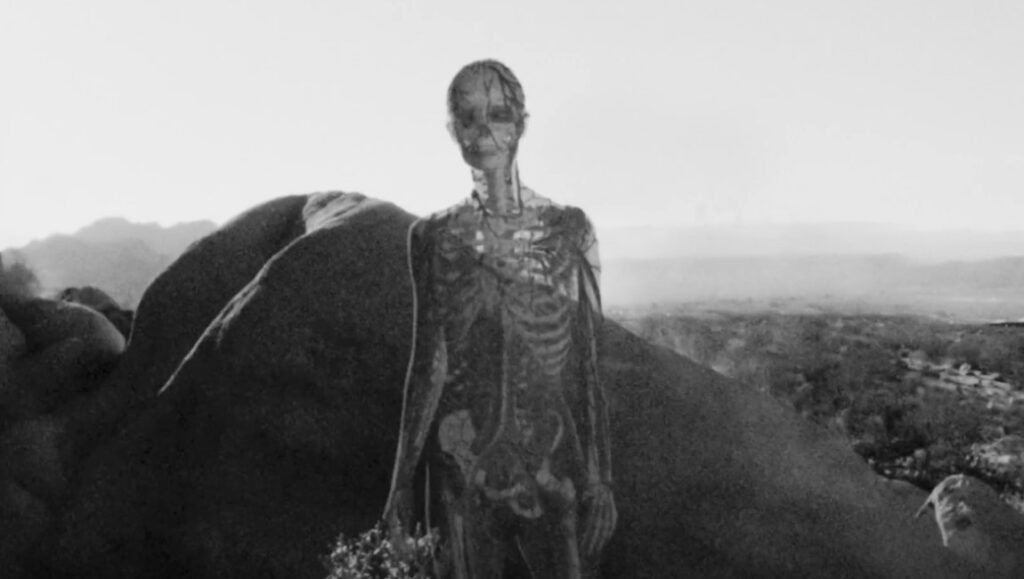The future is forever in Divinity, Eddie Alcazar’s sci-fi experiment-cum-sophomore feature. Building on his first project’s purgatorial claustrophobia, and the technical feats of his 2021 short, The Vandal, Alcazar creates an image of the near future that is as fragmented as it is bizarre, and with an aesthetic that works as a singularly convergent sum despite the divergent hysteria of its parts. Stephen Dorff headlines as a wealthy recluse named Jaxxon Pierce who has inherited, if not mutated, his father’s legacy in developing a serum known as Divinity. In small, perfume-like bottles, the substance grants its users immortality by way of infertility, and possibly a (nefarious) host of other side effects. This is not what Jaxxon’s father Sterling had aspired to; the world has bent and broken to a logic of debauchery and formulaic individuality. The disruption of the natural order seems to attract twin-brother space aliens (Moises Arias and Jason Genao) who, alongside an ethereal, if not illusory, counsel of fertile women (led by Bella Thorne), seek to restore order by facilitating procreation and disposing of Pierce.To do the latter, the brothers hook Jaxxon up to an IV of Divinity; soon his muscles grow and his mind is gone. By the final fight scene — an incoherent, campy cross between a Harryhausen stop-motion battle royale and a half-baked game of Super Smash Bros. — Jaxxon has morphed into a mass of steroidal muscle that most closely resembles something between a rhinoceros and an orca.
The black-and-white estrangement of an otherworldly future makes Divinity a sensory experience that feels rare among contemporary feature films, as they increasingly concede to a narrative pyramid of algorithmic definition. In the vein of the French New Novel and the New Wave Cinema it had a part in inspiring, Divinity shifts the markers of change from time to space. There is evidence that time has passed, but not with its typical signifiers; light, rhythm. What results is a confused sequence of scenes with stillborn tension, languishing in search of a plot, or even a cadence that feels crafted. Alcazar is quoted as saying that the film was developed with no script, and there’s certainly nothing wrong with a film lacking a plot or solely emphasizing stylishness so as to create an experience of total immersion, akin to how you might experience a song. The problem, however, is that Alcazar fails to commit to a sense of montage that creates any sort of unconscious emotional logic, while also foregoing the conventional narrative constructions that would appeal to an intellectual engagement.
A recent example of a film that did the former well is Harmony Korine’s “post-cinema” film Aggro Dr1ft, which was marketed heavily by its infrared cinematography, but which, in reality, was given tempo and propulsion by AraabMuzik’s measured metronome. The difference with Divinity, then, is that Alcazar does not make a full commitment to the film’s absurdity, and what results is a languid narrative structure composed entirely of connective tissue and no muscle. In Divinity, the characters aren’t people as much as they are statuettes, and the lack of depth afforded them, in turn, removes a sense of depth from the world that surrounds them. A similar social effect exists in films like Bresson’s L’Argent, but in those neo-realistic contexts, this device challenges the world we see and know by destabilizing it. When trying to create a new one, this has a demolishing effect, and the viewer is left trying to make sense of the debris.
Alcazar’s strength in Divinity is that of his unapologetic vision. In his world, the weather is unchanging, characters are flat, and there is no clear passage of time; all development, if any, is marked by physical transformation. The result is a lucid, dream-like experience whose rhythm you can easily fall in and out of. But there’s no need for cause and effect because in re-weighting the traditional temporal force of time in favor of space, Alcazar frustratingly forgets to create a new logic for his visual world, one that might compel the viewer. In its half-baked form, Divinity only serves to detract from its sensory ambition.
DIRECTOR: Eddie Alcazar; CAST: Stephen Dorff, Bella Thorne, Scott Bakula; DISTRIBUTOR: Utopia; IN THEATERS: October 13; RUNTIME: 1 hr 28 min.


Comments are closed.